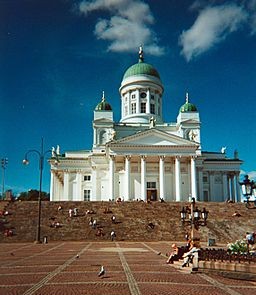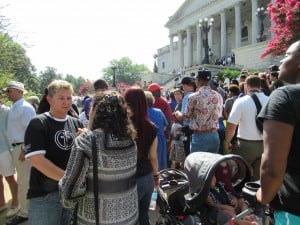
Weeks ago, I read (and reviewed) the Os Guinness book The Global Public Square in which the author advocates not for a secular, or “naked” public square, but for one in which all faiths are allowed to express themselves equally and without fear of discrimination. This past weekend, a conversation relating to the public square could be found on the Wild Hunt related to an article about the experience of religious minorities in Christian-dominated schools. The conversation was, at times, heated, and any discussion on this topic tends to focus on either the removal of faith from the public square or the creation of a level playing as described by Mr. Guinness in his book.
I would argue that a fully secular public square — i.e. one in which religions and the expression of them in words or deed is either unnecessary (preferred) or prohibited — is impossible until we give up on this whole religion thing, which doesn’t seem likely. It’s a dream, albeit one that is better than the reality we all to often deal with, and I wonder if our efforts would be better spent elsewhere.
The Lure of Secularism
I would like to be a secularist.
I think it’s the better way to run a public square because decisions are best made when not unduly influenced by emotion and with a firm grounding in reason and logic. But, I’m also a human male creature with an internally roiling biochemical soup of blood and tissues that give rise to all manner of unreasonable desires, illogical conclusions, and intuitive leaps. Hell, logic would dictate that yesterday I should have exercised instead of eating a complete Chipotle burrito for lunch and then far too many noodles for dinner topped of with some ice cream for dessert.
I’ll let you guess which of those two scenarios actually happened.
Consider the debate surrounding human influences on climate change, infant vaccination, insured access to contraceptives, the appropriate means by which to educate our children, the involvement of financial institutions in investments, and more. Our public square has to be the place in which these topics are discussed and these topics, and many more with which we must deal publicly, often relate directly to our level of comfort and our survival in some way.
It sometimes seems that if we could but remove some religious influences from our discussion that they would be much easier to have. Thus, the lure of secularism is, for me, strong — like the lure of reacting to situations with logic and reason — but it’s a will-o’-the-wisp leading me down a path toward a goal that is so hard to reach that it might be, in effect, unreachable. We are, at least in part, the sum of our experiences and of our beliefs, each giving rise to the other. Furthermore, it is through the lens of our experiences and our beliefs that we see our current situation and build our expectations for the future. I’m not fully sure that I even think it’s possible for us to remove the influences of those beliefs, religious or otherwise, simply because we happen to be working with others who might not share them.
The Lure of the Global
Lacking a better term for it, the lure of the global public square, is that it seems attainable. I find it far easier to imagine a public square that includes and honors all of its participants regardless of their religious views or lack thereof. Plus, I think it’s far more reasonable to expect a person to bring their deeply held convictions, religious or otherwise, with them into the public square then to some how leave them at the door. Many Pagans, for example, sacralize nature in some way and, because of that belief, can be found advocating for environmental causes. It would be ludicrous for anyone to expect a Pagan who believes thusly to leave that behind when discussing such causes.
The problem comes down to the very thing that Jason points out in the conclusion of the above-linked Wild Hunt article; in his words: that “such a [public square] would never work so long as demographic dominance allows ‘quiet’ power to stifle all dissent and diversity.” In other words, that the tyranny of the majority be brought to bear on the minorities within the public square. And, unfortunately, he’s probably right.
Perhaps tyranny is too strong; it implies a somewhat conscious act against the rights of a group of people. I’m not sure that the “quiet” powers that Jason speaks of are always conscious. More likely, they simply the result of a different lens of experience and belief used to observe a situation which, in the United States, is far more likely to include similar Christian influences and points of view than non-Christian ones.
The global public square could work if, somehow, there were no majorities; if all points of view were equally expressed. This is, quite obviously, not the case and I would argue that religion is only one of the influences on our behavior. Simply removing it from the public square does not guarantee that it becomes some how more logical or more reasoned. There are too many other ways that we fool ourselves, individually and collectively, that the more comfortable or the more familiar is the better option even if logic and reason would dictate otherwise.
The Honest Public Square
I wonder if we could find a middle ground in what I choose to call the honest public square. Frankly, I have only been thinking about this idea since the Wild Hunt article this past weekend so it’s not fully formed, but as I see it, we could find a middle ground between the secular and the global public squares. It may not always be a comfortable space but it would be one in which participants are asked to fully and honestly explore their own views–religious and not–and the motivations for them publicly without fear of censure or discrimination.
My idea for the honest public square does not require that someone leave deeply held convictions behind simply because they’re dealing with those who do not share them, but to be ready, willing, and perhaps expectant of the opportunity to share and explore not just the topic at hand, but also the individual convictions that influence ones understanding thereof.
This would have to be a necessarily moderated situation. Someone unwilling to share or explore their convictions, to discussing them honestly, would have to be asked to leave the conversation in some capacity until they are ready to do so. Furthermore, those sharing the majority point of view (and there’s almost always a majority point of view) have to be willing to allow the minority their chance to share their side of things otherwise this idea is nothing more than the situation in which we already find ourselves. To be a viable attempt at a answer for questions relating to how we live together, it has to be different, in some way from what we experience day-to-day.
I’m not fully sure that the honest public square would be all that different, though. I think that we find ourselves in these sorts of situations fairly regularly. Those of us who write here on this blog maybe do so more often than others as we seek out and engage with people from other faith and philosophical communities, but I think everyone has moments within an honest public square. Conversations within some families, biological or chosen, may provide participants with the love and support to explore individuals’ ideas while also the foundational respect for one another that avoids defensive behavior and/or social censure.
But, I worry that the application of an honest public square would, necessarily, remain small-scale. The aforementioned family has an understanding of each other than gives rise to the necessary environment for an honest discussion and exploration of a topic. All too often, without that understanding–without that love–it’s too easy for any one of us discredit or discount the views of others because we understand neither their views nor their person.

Get Face to Face
February 2014
In fact, an honest public square could be said to create the very understanding that it seems to require in order to operate. Can we build something that produces the very thing that it needs to be built? As a physical construct, probably not. But, I hope that we can find a way to do so as a social one.
Want to talk about it?
So do I! February is the month of Pagan Tea Time here on the Pagan Channel at Patheos.com. If you’re interested in discussing the ideas in this post, leave me a comment below. A real-time conversation is likely to yield better and faster fruit than any individual’s ponderings online.















